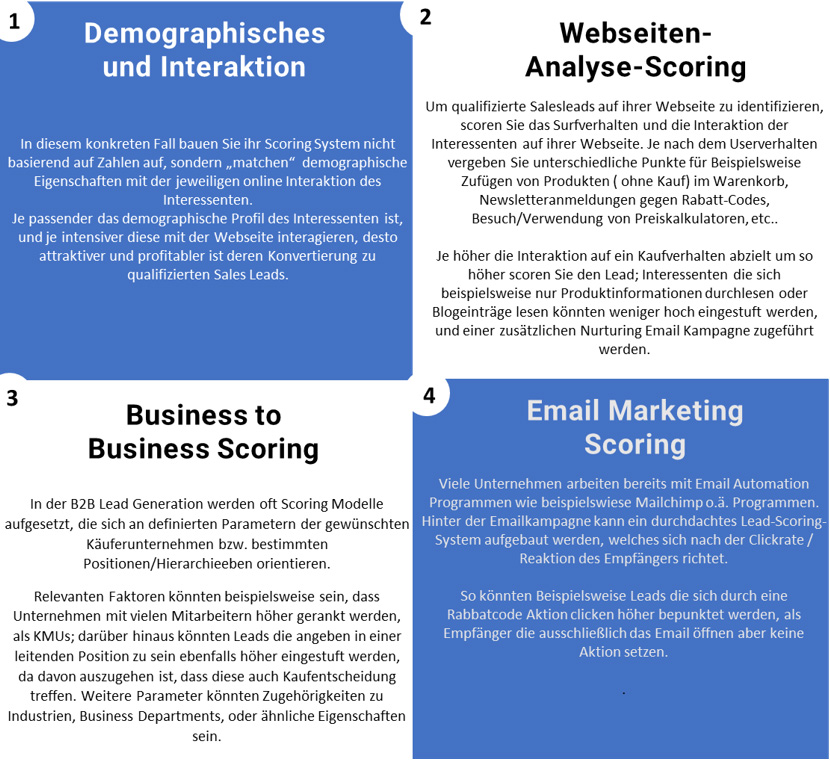Building a lead scoring model
If you already have marketing automation processes in place, you will not be able to avoid scoring your leads according to different criteria in the long term. It should be mentioned at the outset that there is no patent formula for setting up a scoring model, as the evaluation and prioritization of leads must always be adapted individually to the different buyer personas. Regardless of whether lead generation from marketing is done via sweepstakes, whitepapers, special offers, or simply web forms on a landing page or as part of a lead ad campaign on social media platforms, two different strategic approaches can be taken (yes depending on the product, industry, and objective)::
Quantity approach: the focus is on achieving as many prospects as possible, with lead quality playing a subordinate role in the first step. (quantity of leads)
Quality approach: The generation process is aimed at obtaining a small number of high-quality leads, which can be converted into opportunities or customers with less effort. (Quality of leads).
Within these two approaches, a distinction is made between explicit and implicit lead scoring, whereby "explicit characteristics" are provided by the lead itself (e.g.: when filling out the whitepaper request). Implicit characteristics, in contrast, are defined attributes/information you collect through the lead's behavior (newsletter sign-up, preference selections, social media interaction, website behavior, etc...).
WHAT MIGHT THE STRUCTURE OF LEAD SCORING LOOK LIKE? WHERE DOES THE DATA COME FROM AND HOW COULD MARKETING AUTOMATION HELP US?
As mentioned at the beginning, we can't provide you with a patent formula for building a scoring model at this point, as the setup is always based on your individual business model, your product and service portfolio, your marketing strategy and your buyer personas.
Many companies build a scoring system based on scores between 1 - 100 scoring points, with different factors scored differently. It is important that the scoring system is understood as a dynamic overall system into which new facts and analyses are constantly flowing. An example will briefly illustrate this:
The producer of bicycle turn signals has found out through an analysis of its sales data that predominantly female customers are converted to qualified leads 35% more often after clicking on the traffic safety video on the product page than leads who do not watch this video. For this reason, this interaction is scored higher than others in the scoring system,
Here are some examples of how a scoring model could be set up:

Now that we've looked at some examples of how to build a lead scoring structure, the question is, where do companies get this data, and how can marketing automation programs help companies in this area?
The answer is simple and complicated at the same time - the more efficiently data from different sources is successfully compiled into an overall picture, the faster and more efficient the conversion process towards the sales department will be. In an overall view, data can come from analytic programs, from connected third party data (e.g.: the lead states to work at company X > the connected third party data source simultaneously adds all relevant information about the stated company of the lead), from existing information sources such as CRM or marketing automation.
Marketing Automation and Robotic Selling can help you to connect all these lead sources in a fully automated way, and to continuously adapt actions and scoring features by algorithms - based on the machine learning principle!
In summary:
It is worth investing time and meticulousness in building a lead scoring model, as in the long run you will use internal resources in the lead generation process much more efficiently. Your sales teams will receive significantly more qualified leads for the further sales process, will be able to submit better / more targeted offers due to detailed lead profiles, which will have the effect of increasing the conversion rate or a positive MROI (Marketing Return of Invest).
We are available for a detailed discussion on building your lead scoring structure at any time! We look forward to our conversation
We are always delighted to talk about your challenges. Please contact us for a non-binding consultation appointment.
office@blinker.digital



